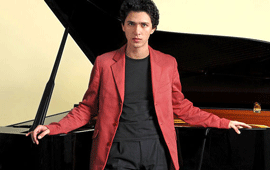> [Archived] Interviews

Eduard Kunz - the piano player and teacher that took on making the world a better place
You are the winner of the piano section of the 2007 George Enescu International Competition. How would you describe this experience?
The George Enescu Competition is without a doubt one of the most prestigious of the world; it is very tough, it has four phases, and the final takes place with the participation of the orchestra. It was a positive experience for me, I won. Not only the orchestra and the high level of the competition's organization, but also the concert hall - The Romanian Athenaeum - were a perfect blend, which turned the whole event into a positive experience for me. The Athenaeum's concert hall is one of the best in the world. As you have mentioned, I won the 2007 competition; I won numerous other competitions since then, and this aspect of my career is complete. I am now more concerned with tours, chamber music and holding artistry classes. Hence, to be completely honest, I don't remember much, but I know I was very pleased to be in Romania and that it was a brilliant experience.
What made you return to Romania?
It is a personal matter: my fiancé lives here. I think now is a good time to mention that the masterclasses couldn't have taken place without the organizational skills of Anca Preda, piano teacher at Transilvania University in Brasov, and Sergiu Tuhuțiu, one of the best musicians in Bucharest.
What is it like to pass from being in the seat in front of the keyboard to being in front of students? How would you describe the pedagogical experience?
I treat the artistry classes as if they were recitals. If during a recital the audience is feeling and thinking about love, friendship, humanity and everything pure and important in life, and if, in the meanwhile, they aren't bored to death, then I consider my mission as an artist accomplished. It is the same with the masteclasses. If I accomplish to give more than a simple technical lecture (which I do anyway), if I accomplish more than just sharing my experience on stage, if I accomplish to also share my enthusiasm and love for music and make the students discover and overcome the difficulties, love what they do, then my mission as a teacher is fulfilled. In other words, it is about making the world a better place little by little.
Translated by Mihaela Dănăcică
MTTLC, Bucharest University














